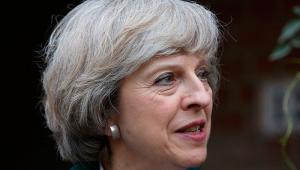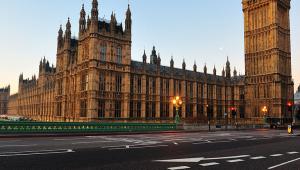The prime minister unveiled the pledges this morning in Halifax, Yorkshire – a marginal Labour seat - saying “now more than ever, Britain needs a strong and stable government to get the best deal for our country.”
“I believe our United Kingdom can emerge from this period of great national change stronger and more prosperous than ever before,” she said today launching the manifesto Forward, Together.
The manifesto pledged to make sure “our economy stays strong” and “brings prosperity to the whole of our country”, which would included “responsible public finances”.
Winter fuel payments for pensioners will be means-tested, if the Conservatives form the next government, and people will pay more towards home care visits to plug the £2.8bn social care funding gap.
In 2020 the Conservatives will replaced triple lock on pensions with double lock, meaning that pensions will rise in line with the earnings that pay for them, or in line with inflation – whichever is highest.
Forward, Together said net migration at 273,000 was still too high and aims to reduce it to the tens of thousands “rather than the hundreds of thousands we have seen over the last two decades”.
The manifesto also promises to:
- Increase NHS spending by a minimum of £8bn in real terms over the next five years
- Give an extra £4bn to schools in England by 2022
- Meet the 2015 commitment to deliver a million homes by the end of 2020 and deliver half a million more by the end of 2022.
CIPFA chief executive Rob Whiteman said: “The Conservative’s manifesto takes a significant step forward in putting public services on a more sustainable footing.”
What the 2017 Conservative manifesto includes:
Health and social care:
- Increase NHS spending by a minimum of £8bn in real terms over the next five years
- Introduce a new GP contract to help develop wider primary care services
- Retain the 95 per cent A&E target and the 18-week elective care standard
Education
- An extra £4bn for schools in England by 2022 - partly funded by an end to the current provision of free school lunches for all infant pupils in England - all children to be offered free school breakfast
- Build up the investment funds of our universities across the UK
- Continue with programme of free schools, building at least a hundred new free schools a year
- Lift the ban on the establishment of selective schools
Housing
- Meet the 2015 commitment to deliver a million homes by the end of 2020 and deliver half a million more by the end of 2022
- Reform Compulsory Purchase Orders to make them easier and less expensive for councils to use
Economy:
- Eliminate the deficit by 2025
- No increase to VAT
- Increase the personal allowance to £12,500 and the higher rate to £50,000
- Follow through with plan to bring corporation tax down to 17%
- Increase the National Living Wage to 60% of median earnings by 2020 and then by the rate of median earnings
- Invest more through The National Productivity Investment Fund bringing the total spent on housing, economic infrastructure and research and development to £170bn during the next parliament
- Create UK sovereign wealth funds - which will hold in trust the investments of the British people, backing British infrastructure and the British economy
- Develop the shale industry in Britain
- Invest £600m by 2020 in electric vehicle technology
Pensioners:
- Winter fuel payments for pensioners to be means-tested and people to pay more towards home care visits to plug the £2.8bn social care funding gap
- Pensioners would stop paying for their own care once their savings and assets are down to £100,000. At present only £23,250 is protected
- In 2020 replace triple lock on pensions with double lock meaning that pensions to rise in line with the earnings that pay for them, or in line with inflation – whichever is highest.
Devolution and local government:
- No powers to be centralized after Brexit and more powers to be devolved to home nations
- No possibility of second Scottish referendum “until the Brexit process has played out”
- Move significant numbers of UK government civil servants and other public servants out of London and the south-east to cities around the UK
Brexit and immigration:
- Agree a deep and special partnership with the European Union
- Conservatives will continue to commit the same cash total in funds for farm support from the EU until the end of the parliament
- Enact a Great Repeal Bill converting EU into British law
- But will not bring the European Union’s Charter of Fundamental Rights into UK law or repeal or replace the Human Rights Act while the process of Brexit is underway but we will consider our human rights legal framework when the process of leaving the EU concludes
- UK will remain signatories to the European Convention on Human Rights for the duration of the next parliament
- Work towards annual net migration in the tens of thousands
Defence:
- Meeting the 2% NATO target and increase spending by at least 0.5% more than inflation every year
- Retain the Trident continuous-at-sea nuclear deterrent
- Maintain the overall size of the armed forces
- Invest £178bn in new military equipment over the next decade
Transport:
- Continue High Speed 2, Northern Powerhouse Rail and the expansion of Heathrow Airport
Other commitments:
- Repeal the Fixed Term Parliaments Act
- In addition to the 11 million trees the government are planting across our nation, the Conservatives will ensure that 1 million more are planted in towns and cities
- Free vote on the future of the Hunting Act
- Produce a comprehensive 25-year Environment Plan
- Spend 0.7% of GDP on development
- Channel 4 will remain publicly owned and will be relocated out of London
- Invest over £1bn to modernise the prison estate
- No second stage of the Leveson Inquiry into the culture, practices and ethics of the press











